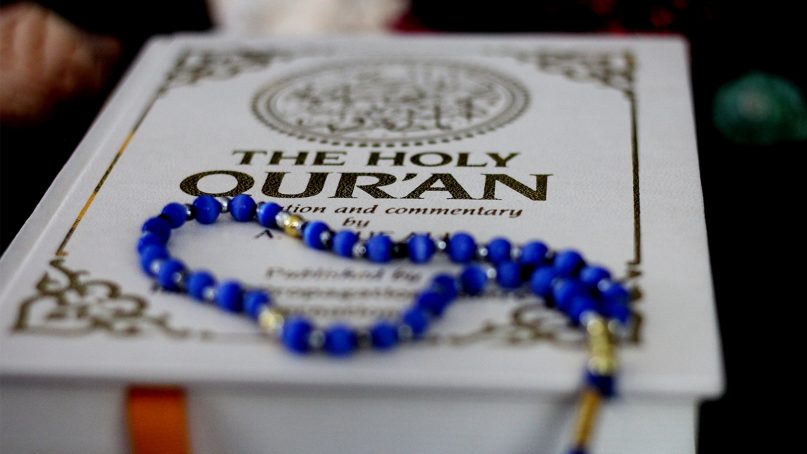(RNS) — In 2010, Terry Jones, a pastor in Florida, went viral with a video of his burning the Quran as he called for an international “Burn the Quran Day,” to be held on each anniversary of the Sept. 11 attacks. Since then, Jones has seemingly disappeared. You could argue that his virality was due to the public’s horrified shock at the gross act of desecrating Islam’s most sacred text — according to Islamic tradition, the literal word of God.
Except that people just keep burning the Quran. This past week, Rasmus Paludan, the Danish-Swedish leader of the anti-immigration and anti-Islam group Hard Line, made headlines as he burned a Quran outside of the Turkish Embassy in Stockholm. Paludan, who first gained notoriety in 2017 when he began posting Islamophobic content on YouTube, has since remained in the headlines solely through multiple public displays of Quran burning.
His acting out has made Paludan a persona non grata among some of his fellow citizens: In 2019, Hard Line was unable to secure a single seat in the Danish national elections. But it hasn’t stopped him, and he plans to run again in Denmark’s June elections.
That’s not to say his stunt didn’t have an impact. It has given Turkey, the only Muslim-majority member of NATO, cause to veto Sweden’s membership in the mutual defense pact. Turkey canceled an upcoming visit from Sweden’s defense chief due to Paludan’s antics, even after Swedish Prime Minister Ulf Kristersson condemned Paludan’s actions as “deeply disrespectful.”
But critics of Swedish authorities point to the fact that Paludan’s actions were protected under “freedom of speech” laws, and an active Swedish police presence facilitated the burning.
Riots and protests have ensued in several major European cities, and in the Arabic-speaking world, the hashtag #مقاطعة_إيكيا_السويدية, or “#Boycotting the Swedish IKEA,” has gone viral.
With public pressure mounting, Kristersson tweeted: “Freedom of expression is a fundamental part of democracy. But what is legal is not necessarily appropriate.”
A few days after Paludan’s stunt, meanwhile, we learned that Swedish authorities helped prevent a burning of the Torah, the Jewish holy text, outside the Israeli Embassy in Stockholm.
Does Islamophobia explain the double standard? The Islamophobia industry is a dumpster fire of various individuals and ideas, all inspired by ignorance. From Israel’s bombardment of Gaza and the West Bank, including the killing of 10 Palestinians in a Jenin refugee camp this past week, to China’s concentration camps filled with millions of Uyghur Muslims, to Indian Prime Minister Narendra Modi’s record of egregious human rights abuses against Muslims in Gujurat, Islamophobia, like evil, has no uniform. It’s a global phenomenon that seeks to otherize, isolate and decimate Islam and Muslims alike.
Defending free speech while taking exception to anti-Muslim hate in diplomatic language has no hope of moderating the views of people like Paludan. In a December 2018 video, Paludan said, “The best thing would be if there were not a single Muslim left on this Earth. Then we would have reached our final goal.” In football terms, the Islamophobia playbook is a bunch of random Hail Marys.
It’s also always part of a broader package of bigotry. As I’ve written before, the insulting of the Prophet Muhammad (peace be upon him) is never in isolation, nor is the burning of the Quran. For that reason, we need to address it as a policy matter, within countries and internationally, choosing not to focus our response on the likes of Jones or Paludan, who in the end only target Muslim minorities to demonstrate their own tribe’s supposed superiority.
Like the fire they use to burn the word of God, they will wither away without their oxygen — attention — and fade back into irrelevance. As a Muslim, I can attest that burning the Quran has little effect on our faith or our feeling for our core text. These demonstrations only strengthen our belief in God’s promise of the preservation of the Quran, word for word, and letter by letter. Hundreds of thousands of Muslims around the world are even now memorizing every word of the Quran by heart, keen on honoring the word of God and establishing it in their hearts.






